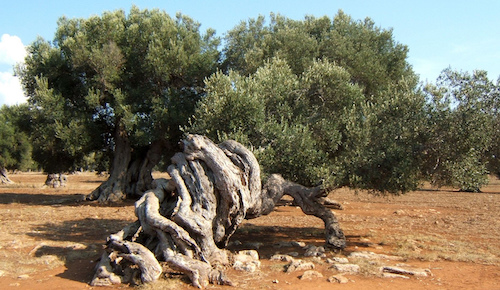
“If Mona Lisa had been in danger, we would not think it’s just a matter of Louvre museum or art experts. We would think it’s a matter of the whole humanity. In the same way Xylella is not a matter of concern only for the Apulia region and farmers: the landscape legacy of Salento, with its centuries-old olive trees, it’s a world heritage. Our duty, as scientists, is to realize many open field laboratories in this region while fostering public awareness and engagement on this issue”.
These are the words of Riccardo Valentini, physicist, member of the Strategic Council of the CMCC Foundation and author of the IPCC reports, at the conference “Lotta alla Xylella: le prospettive della ricerca” (Fight against Xylella: the perspectives of research) organized by Coldiretti on July 18th, 2017, at MUST museum in Lecce.
A day entirely dedicated to research on Xylella fastidiosa (Xf), the bacterium associated with the severe disorder responsible for declining olive trees (olive quick decline syndrome), bringing together the leading researchers of the Apulia region.
Regarding the different factors associated with the olive tree disease, we can state that the olive quick decline syndrome is affected by global climate change. “Climate change is a reality”, Valentini says, ” it’s about all of us and has important implications for our ecosystems. Trees are particularly affected by climate change (it can seem obvious, but it is worth noting that unlike animals, trees can’t move and migrate searching for more favourable conditions). Water stresses induced by peculiar climate conditions can weaken plant defenses: if we look at the map of global tree mortality, we see that in the last decades tree mortality is increasing. Even here in Salento olive trees will be more susceptible to disease under stress conditions.”
Therefore, in the next years a key challenge for the research will be to clarify the relationship between climate conditions and Xf.
Another crucial point will be the set-up of a cutting-edge methodology for monitoring and early detection of infected plants. To that end, the research team of Prof. Valentini has already developed some sensors to be installed on the trunk of the olive trees in the following months. “Sensors have been already used for other research projects (e.g. in Russia)”, Valentini explains. “They will allow us to acquire data such as water transport in plants, trunk moisture, and leaf spectral properties”. These parameters will help in monitoring plant conditions and in acting promptly while using low-cost and cutting edge technologies.
In addition to Riccardo Valentini, the following speakers attended the meeting “Lotta alla Xylella: le prospettive della ricerca”: Antonio Pepe (Direttore Distretto Agro-alimentare Regionale), Giuseppe Ciccarella (DISTEBA – Università del Salento), Donato Boscia, Maria Saponari and Nicola Savino (IPSP – CNR Bari, Disspa – Università di Bari and CRFSA), Federico Lanotte (IPSP – CNR Bari), Giovanni Mita (ISPA – CNR Lecce), Giovanna Mangialardi (Ingegneria dell’Innovazione – Università del Salento).
Pantaleo Piccinno, President of Coldiretti Lecce, opened the conference.
Moreover, Loredana Capone (Assessore alle Attività Produttive Regione Puglia) and Gianni Cantele (President of Coldiretti Puglia), took also part in the event.
Giuseppe Brillante, Coldiretti Lecce Director, was the moderator of the conference.
For further information:
Read the news: “Xylella fastidiosa: how science tries to save olive trees“.
The XF – ACTORS project: 29 partners, 14 countries, an international project coordinated by Italy in which the CMCC Foundation is involved (lead partner: CNR, Bari headquarters, Istituto per la Protezione Sostenibile delle Piante – IPSP).


